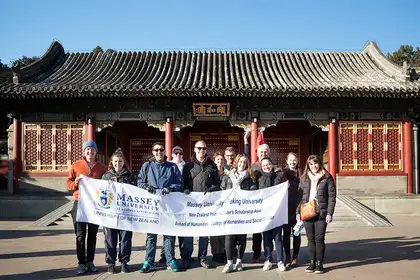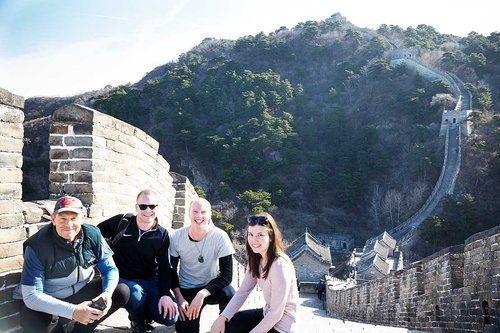
Massey Chinese language students in Beijing visiting the Summer Palace
A six-week study trip to China funded by a Prime Minister’s Scholarship to Asia (PMSA) has given 15 Massey students a deeper appreciation that learning Mandarin is a ticket to greater cultural understanding and job opportunities in the future.
Several in the group, including a lawyer, a photographer and a finance banker, have shared their personal experiences in a video. All agree their Chinese language skills improved markedly through the immersion experience involving language classes at the prestigious Peking University (PKU), as well as field trips, cultural excursions and meeting locals during the trip last November to December.
Bachelor of Arts student Haluk Gokcen, who is majoring in Chinese, and also studying Spanish and French to fulfil his dream to work for the Ministry of Foreign Affairs and Trade, says when he arrived in Beijing he could “hardly hold a conversation. Now, I can write text messages and speak to locals without having to use a translation app.”
Kate Parkinson, who works in finance banking for a major bank following her Bachelor of Business Studies at Massey’s School of Business and is now completing a Graduate Diploma in Arts majoring in Chinese, says the scholarship trip “really helped to grow my confidence in using the language and understanding the social norms.”
Ukraine-born New Zealander Victoria Kirichuk, who speaks four other languages, says that as well as benefiting her Chinese language ability through the immersive experience, the trip gave her the chance to “get to know the real China.” She says the scholarship encourages people wanting to invest time in language learning and cultural engagement, so they can bring that knowledge back to New Zealand to their own communities; “and become bridge-builders between China and New Zealand.”
The scholarship, worth $112k, was awarded to the School of Humanities’ Chinese language programme, led by Dr Michael Li at the Auckland campus. He accompanied the group of mostly distance students, including some part-time students enrolled in a Humanities 200-level Special Topics course, themed around language, culture and industrial experience to count as an elective credit towards their degree study.

Massey Chinese language students (from left) Llorne Howell, Tim Cammell, Dillon Anderson and Kate Parkinson visiting the Great Wall of China.
Cultural and language exchange bodes well for future
Dr Li says there is a need for more New Zealanders to communicate and understand China in a cultural context due to the growth in trade and business connections between the two countries. “Stronger cultural, language and linguistic ties – ties that sow the seeds for long-term trade and collaborative opportunities between New Zealanders and Chinese – need to be established through language and cultural exchange and business experiences,” Dr Li says.
Massey’s Bridging NZ and China by language learning and business experiences scholarship application provided such opportunities for New Zealand students to engage with China, he says. “For any New Zealander wishing to undertake business and cultural activities, the acquisition of Chinese Mandarin will be vital to their success. At a time when the study of languages across the university sector is in decline, Massey University sees the Prime Minister’s Scholarship to Asia programme as integral in highlighting Chinese language acquisition in New Zealand.”
The students’ programme included classes in the School of Chinese as a Second Language at Peking University, as well as cultural activities and field trips to the Great Wall of China, a tour of the Forbidden City and Olympic Centre in Beijing, Tiananmen Square, the Summer and Winter Palaces, as well as visits to Chinese dairy group Sanyuan Dairy factory and China Hi-Tech Group, which is involved in the provision of educational technology.
Associate Professor Kerry Taylor, head of the School of Humanities, says that for many decades, Massey has recognised the importance of establishing academic and commercial partnerships with key countries in Asia, particularly in the Agriculture and Environment area. In the last few years, the Institute of Agriculture and Environment of Massey has established collaborative relations with two Chinese universities – Shanghai Jiaotong University and Lanzhou University in Western China – through the New Zealand-China Tripartite Fund. In 2015, a humanities perspective was added.
“Since that link in 2015 the School of Humanities has taken a leading role in the Massey engagement with China,” he says. “We’ve established a Joint Research Centre with Beijing Language and Culture University. This involves a major ongoing research project on Chinese language teaching mediated through technology, led by Professor Cynthia White and co-hosting a major annual conference in China on Chinese as a second language.”
The School of Humanities has also taken up a three-year commitment to teach a New Zealand history and culture paper at Peking University, and has engaged actively with its New Zealand Centre. In addition, the School has hosted two visiting Peking University professors, while three Massey staff have taken up research fellowships at Peking University.
“The PMSA group is another important element on growing mutually beneficial links between New Zealand and China, and part of our ongoing engagement with PKU, which is generally regarded as the top university in China,” Dr Taylor says.
New Zealand statistics indicate that the trade with China has nearly tripled over the past decade, with two-way trade rising from $8.2b in the year ended June 2007 to $23b by June 2016. Annual exports to China have quadrupled while annual imports from China have doubled since June 2007.
To find out more about studying Chinese language: https://bit.ly/2S8Z9Rn